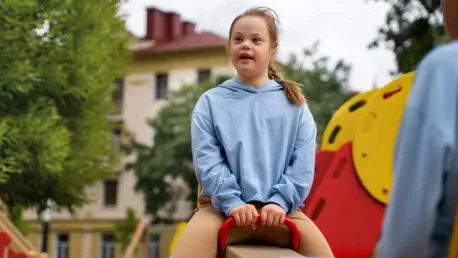A deeply disturbing incident has been brought to light involving a paraeducator at a rural Kansas school district, who allegedly subjected a 15-year-old student with Down syndrome to severe physical and emotional abuse. According to a federal lawsuit filed by the teenager’s parents, the student experienced repeated mistreatment by the paraeducator, leading to significant emotional trauma and behavioral deterioration.
Allegations of Abuse
The accusations against the paraeducator include forcing the teenager into a utility closet, hitting him, and once locking him in a cage used for storing athletic equipment. The paraeducator allegedly photographed the teen in the cage and circulated the image among district staff, comparing the boy to an animal and making jokes about the situation. Such behavior, if proven true, represents a blatant disregard for the dignity and well-being of a vulnerable student.
Implicated Individuals and Oversight Failures
The lawsuit not only targets the paraeducator but also implicates other special education staff and the district itself. Despite concerns expressed by some staff members about the abuse, no action was taken by higher authorities to prevent or stop the misconduct. Previous complaints regarding the paraeducator’s treatment of disabled students had also reportedly been ignored, indicating a troubling pattern of oversight failures within the educational institution.
Discriminatory Treatment
The abuse appeared to be specifically directed at the student due to his disability, with punishment inflicted for minimal or nonexistent behaviors. The paraeducator’s actions were excused by some as “tough love,” reflecting a dangerous normalization of abusive practices under the guise of discipline. This discriminatory treatment underscores a broader issue of how disabled students are viewed and treated within some educational settings.
Emotional and Physical Impact on the Teen
As a result of the ongoing abuse, the teenager’s behavior deteriorated significantly. Initially able to communicate in short sentences, the boy began to refuse to leave his home due to fear and engaged in self-harm—clear indicators of severe emotional trauma. The emotional and psychological impact on the student cannot be overstated and serves as a stark reminder of the importance of safeguarding the mental health of vulnerable students.
Lack of Accountability
The lawsuit highlights a significant gap in accountability, noting that no criminal charges or disciplinary actions have been recorded against the paraeducator or others implicated. This points to a systemic failure where even severe allegations of abuse did not result in prompt administrative or legal action. The absence of accountability not only fails the abused student but also endangers other students who may be at risk.
Parental Intervention and Reporting
When the parents of the teenager raised concerns, a staff member did report the incidents to the state child welfare agency. However, this action seemed insufficient to spur substantive intervention or change within the district. The case reveals deficiencies in how parental concerns and reports of abuse are handled, further emphasizing the need for a more robust and responsive system.
Overarching Trends and Consensus
Systemic Neglect and Ethical Lapses
This case underscores a deeper issue of systemic neglect and a failure within the educational institution to protect its most vulnerable students. Instances where concerns were either brushed off or unreported reflect a serious lapse in ethical responsibility among the staff.
Normalization of Abusive Behavior
The reference to treating the student with “tough love” suggests a disturbing trend where abusive behavior towards disabled students is rationalized and accepted under disciplinary pretexts. This normalization of abusive practices underlines the immediate need for a cultural change within the educational system.
Structural Coherence and Nuances
The narrative cohesively paints a picture of not just individual misconduct but a broader culture of negligence and inadequate oversight within the school district. It provides a detailed account of the abuse faced by the teenager, highlighting the severe impact on his emotional well-being while pointing out the systemic failures that allowed such abuse to persist.
Main Findings
A troubling incident has emerged from a rural Kansas school district involving a paraeducator who allegedly inflicted severe physical and emotional abuse on a 15-year-old student with Down syndrome. This alarming situation came to light through a federal lawsuit filed by the teenager’s parents. The lawsuit details how the student endured ongoing mistreatment at the hands of the paraeducator, which led to significant emotional trauma and behavioral issues.
To provide further context, paraeducators are typically essential support staff in classrooms, helping students with disabilities to navigate their educational environment. In this case, however, the paraeducator is accused of doing the opposite, causing harm to the very student they were supposed to protect and support. The repeated abuse is said to have taken a serious toll on the student’s mental health, leading to notable behavioral changes and emotional distress. Consequently, the student’s parents have taken legal action to seek justice for the harm done to their child, shining a spotlight on the critical need for stringent oversight and accountability in educational settings.









